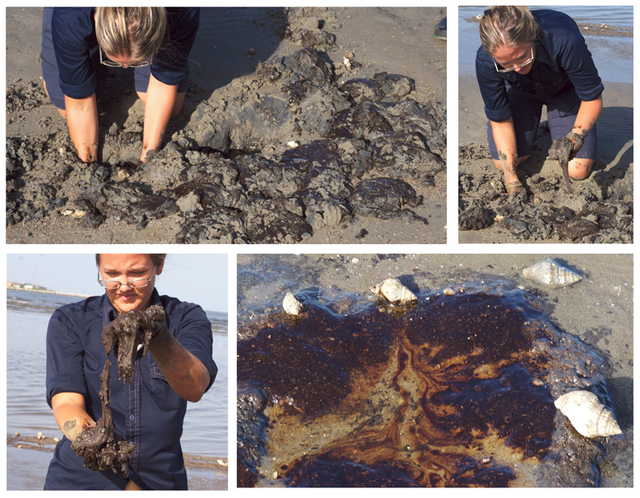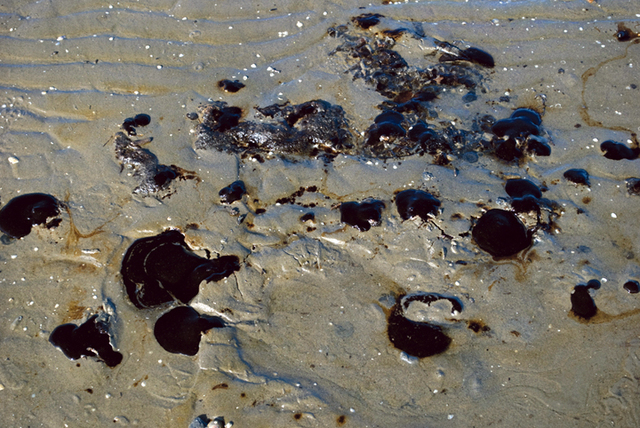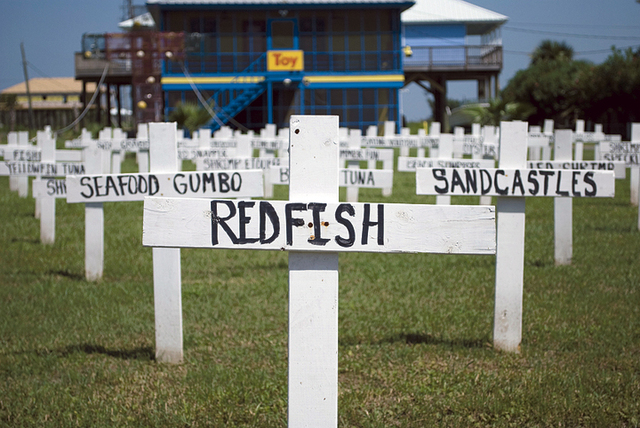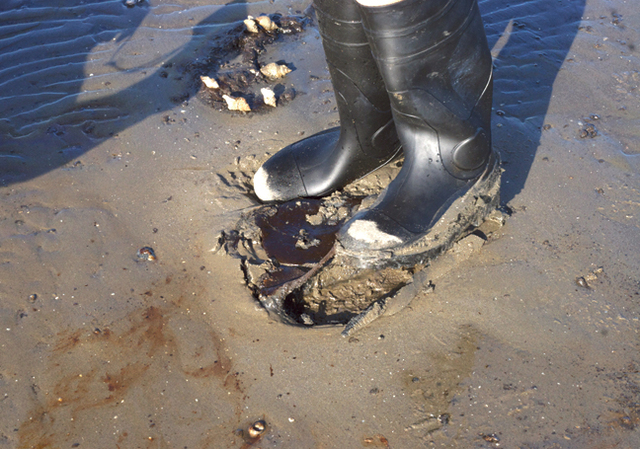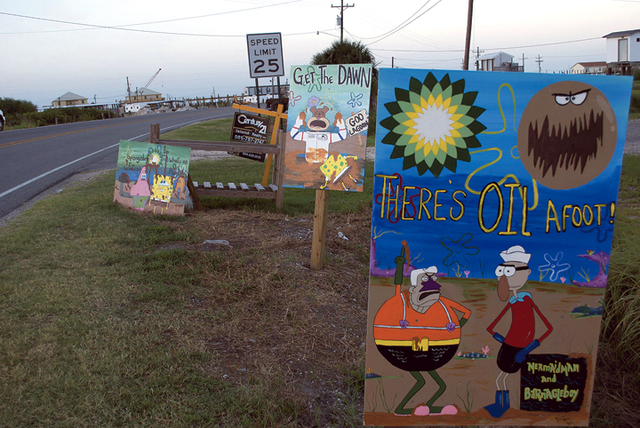When the sun sets in Grand Isle, La., it casts a fiery glow around the marshland. It sinks slowly, igniting long, wispy clouds. Orange light stretches along Louisiana Highway 1. The large amounts of oil stuck to the rims of the area’s thousands of marshes turn green stalks of grass into yellow kindling. Despite the abundant fuel, the ocean swallows the blood-red disc and begins to reflect the cool night sky.•Six fishermen watch the ocean’s nightly victory from the other side of the highway. They each drink Bud Light and lean into patio chairs. The patio table they’re gathered around is underneath fisherman Chris Camardelle’s house; Grand Isle homes sit on wooden stilts as a precaution against hurricanes. They meet here almost every night to sip beer and shoot the breeze. “Everyone who is sitting here I guarantee you is scared to death of what’s going to happen next year, the rest of this year,” says Bobby Jackson. These six men have a combined fishing experience of at least 180 years. They tell stories of fishing for shrimp at age 9 and spending most of their childhoods playing with blue crabs in the cabins of their fathers’ boats. After Hurricane Katrina, Grand Isle, an island with a population of about 1,500 people, was in ruins. The fishermen say they helped each other search for mailboxes, repair support beams and rebuild walls. Following a few months of cleaning up and rebuilding, things went back to normal. “Katrina in New Orleans is nothing compared to what this is,” Harry Cheramie says, slapping the table for emphasis. “This here is totally different. … How do we help each other? What do we do? Right now, the only one that can help us is if BP can keep our boats working for ’em. That’s what we need. That’s our income.” Four of the fishermen work for the Vessels of Opportunity, a BP program that employs fishermen put out of work by the spill. A blowout preventer burst on BP’s Deepwater Horizon oil rig on April 20 and started dumping up to 62,000 barrels of oil into the Gulf each day, according to final estimates in the Washington Post . The fishermen say they had no choice but to join the Vessels program because of the disaster. Though Jackson says the fish didn’t appear to be covered in oil at the time, fishing was banned on May 2. But even before the ban, he says the spill made it difficult to make a living. “Everybody in the country is basically scared about the seafood that comes out of the Gulf,” he says. “The last trip we made on my boat, we came in, we called New York to get prices on our fish to see where we wanted to send them to. They didn’t even want ’em, and New York’s the biggest market in the country.” Jackson and his peers also worry that even after the cleanup, the public will continue to avoid fish and shrimp pulled from the Gulf. “Anything in the Gulf, mainly off the coast of Louisiana, people won’t buy it,” Jackson says. Since he had to stop fishing, he says he was forced to consider selling his boat after more than 30 years on the water—until the BP program started offering jobs. However, he says, fishermen in Grand Isle are worried BP is trying to make the case that the oil is cleaned up. “I had to just shut my operation down and got on with Vessels of Opportunity,” he says. “That doesn’t look like that’s going to last too long. It looks like BP’s trying to sweep it under the rug. The oil is still there. It’s not going nowhere, and it’s going to come to shore.” • The fishermen speak of the oil like it will resurface at any time. BP installed large floating partitions with nets for oil, called booms, around even the smallest islands, but their nets only hang 18 inches on average. So oil that has been dispersed or settled on the bottom can float underneath the boom onto the shores at the whim of undercurrents or tropical storms. Grand Terre Island, just northeast of here, was among the most saturated around Grand Isle after the spill. For example, thousands of tar balls—which look like melted chocolate—appeared and covered most of that island’s east shore on July 26. BP workers cleaned the island the next day. It was pristine until July 31, when a roughly 10-foot long, one-foot-wide deposit of oil found its way onto the shore. “The oil’s there. Just because you can’t see it on the top, it’s there,” Camardelle says. “It’s still there.” The National Oceanic and Atmospheric Association confirmed June 23 that massive subsurface plumes existed near the wellhead, some as deep as 4,600 feet. “We’re fishermen. We’re bottom-draggers,” Cheramie says. “Anything on the bottom I catch, and if that oil’s on the bottom I’m going to catch it.”Even though the oil spill has made the fishermen’s futures uncertain, the six at Camardelle’s house say offshore drilling is crucial to life in the Gulf Coast. They say the price of gas to power their boats would rise substantially if gas weren’t available so close to home and, mostly, they fear the loss of oil industry jobs would cripple the state’s economy. The oil industry employs 32,000 people along Louisiana’s coast, according to the McClatchy news bureau. In Houma, a nearby town, about 60 percent of the jobs are oil-related, according to Terrebonne Parish President Michel Claudet. “If they shut the oil down, we shut down,” Cheramie says. “That’d put so many people out of work. That’s hurting us.” The moratorium on drilling that President Obama instated May 6 and extended for six months on May 27 was the wrong way to go about things, Jackson says. (A federal judge struck down the moratorium June 22.)“When an airplane crashes they don’t shut down the whole industry for that,” Jackson says. “They’ll find out what’s wrong and what to do without shutting down.” The fishermen are warily grateful for the Vessels of Opportunity paycheck. If it weren’t for BP, they’d still have their jobs. But if it weren’t for the program, they’d have no options on Grand Isle at all. These men might have fishing prospects in a nearby state, but they’d have to uproot themselves from a community they’ve helped to build and uphold. Terry Pizani can recall installing the 25-mile-per-hour sign in front of Camardelle’s house 40 years ago; Cheramie reminisces about helping to build his neighbor’s shrimping boat in his backyard and then organizing 20 or so fishermen to carry the vessel to the ocean.“I could move to Texas,” Jackson says.“I ain’t movin’ to Texas,” Cheramie says. “I ain’t either,” Camardelle adds. “I got my roots set here.”“That would be my only option,” Jackson reiterates. “I wouldn’t have to move there, but I’d have to send my boat there. That would be my only option, and it wouldn’t be a good one.” Camardelle, whose house is the venue of this nightly get-together, says he once tried to work in another field but was unsuccessful. A friend told him about a job fair recently.“OK, 51 years, that’s all I been doing in my life,” he says. “I said, OK, well, I want to take up brain surgery.” The fishermen often speak about returning to normalcy. Before the spill, they say they could leave their house doors unlocked, car keys in the ignition. Now, because of the influx of outsiders—members of the media, BP workers—they feel less safe. “We’re not used to what’s happening right now,” Camardelle says. “A key stayed in our vehicles from the moment you buy the vehicle till the time you got rid of it.” “We used to live in a place like that,” chimes in Pizani. The crime rate, according to the Grand Isle Police Department, has actually gone down since the spill. There were 29 arrests in July 2009 and 22 in July 2010. At Grand Isle State Park, crime reports dropped from 24 to one. Peggy Chighizola, secretary to the chief of police, says the drop is due to the decrease in tourists. Still, the fishermen’s perspective is that they’re unsafe. The men remain loyal to BP and say it’s politics that wounded the Gulf, though they offer few specifics.“I’m working for BP now. I got nothing bad to say about them. It wasn’t their fault,” Pizani says. “I’m glad to be working for ’em. They’re keeping our heads above water right now, but how long is it gonna last? Are they gonna make us whole like they say they are?” The fishermen say they won’t be made whole until they return to their pre-spill way of life. “I’m hoping that there’s no oil on the bottom, and we can get to work,” Cheramie says. “We would rather be doing our job.” •Brian Zito, another Grand Isle fisherman, paints a less rosy picture of VOO. This is a man who says BP screwed him over twice. Like Jackson and the others, he had to stop fishing because of the May 2 ban. And now his boat is sitting on its dock, unused, even after he shelled out between $1,500 and $2,000 to meet the safety standards for the program. He says boats from out of town are put to work instead of his, and some boat owners are getting paid simply for being on standby.At a July 29 town hall meeting attended by about 50 people in Grand Isle’s community center, BP spokesman Jason French finds himself barraged by pointed questions hurled in thick Cajun accents, including Zito’s. French is trying to explain why some people aren’t being put to work.“The VOO program is designed so we can bring on local, commercial boats. One of the mistakes we made early on—”“So I got to pay for the mistake!” Zito shouts, cutting French off. He jabs his callused finger in the spokesperson’s direction, and the two packs of cigarettes in Zito’s T-shirt pocket almost fall out. “Why I’m not put on standby like the rest and drawing a check?”He says administrators called him at the end of his sixth day on the job to tell him he and his boat were no longer needed. “I spent a bunch of money I didn’t have to work for six days,” Zito says, “and got shit-canned.” “The reason why your boat may have been let go—boats have to meet a specific job,” French offers. Boats in the program are hired for particular tasks like skimming for oil or transporting workers. Perhaps Zito’s boat doesn’t fulfill the requirements, French ventures. Zito looks at his feet to subdue his anger several times through French’s explanation.“They give you a contract to fill out that’s that thick,” Zito counters, holding his thumb and forefinger about an inch apart. “It asks you everything about the boat except what it smells like.” His contention is the program’s administrators should have known whether his boat was usable before it touched water. But Zito is often too angry to let the BP employee respond at the community forum, erupting into shouts as French tries to console him. “I knew your name,” French says, referring to the roster of fishermen slated to get called up for work. He holds his hands up to try and calm Zito down, who is on his feet now. “We’ve been pushing to get your name on that list—”“That list don’t pay my bills, man!”Zito has been a fisherman for most of his life. His neck is a shade darker than the rest of his skin. He wears a gold chain with an anchor pendant, not a cross. And he finds the bureaucracy of the wait list difficult to bear.He says opportunists from out of town took his spot on the list, and people who already had jobs bought boats simply for the program. He knows of at least three other fishermen on Grand Isle in his idle position, he adds.“I don’t think y’all rented one dock of one person who sleeps 12 months a year on Grand Isle,” Zito says. In his mind, VOO is employing exactly the wrong people.“They got lawyers, they got doctors with boats. They ain’t taking all the people who live here all their lives,” he says. “You got people who haven’t fished a day in their life, except to catch a speckled trout or something like that.”French assures the room that BP will try to refocus its efforts on employing local fishermen directly affected by the spill. “We absolutely are responsible for that and owe you the money you lost,” French says. “I understand the frustration of seeing other people paid in the VOO program. I would be frustrated in your shoes.”French also says BP is aware of the problem of employing those who live away from Grand Isle or have other sources of income. “What we need to go after is the weekend warriors and anybody that’s outside of the area,” he says to applause. Zito’s hands resolvedly stay on his thighs. He shakes his head.Later, as he stands outside the center and smokes a cigarette, Zito says he appreciates French’s sympathy and admits that the program is beneficial to some Grand Isle fishermen. Still, he would much prefer an apology he could spend.“I’ve been coming here since I was yay-high to a grasshopper. I’ve been living here permanently for 35 years,” he says. “The promises ain’t paying my bills. I done spent money that I didn’t have to get my boat ready to work for BP. And what’d I get?”Since he can’t fish or work, Zito is living off his savings. “What options do I have?” he asks. “I can’t make ’em hire me.”The BP website says 3,000 boats were contracted with VOO as of July 7, and boats are called up based on the job at hand. Workers are paid either $200 or $300 a day, depending on how many hours they put in, and boats owners are given between $1,200 and $3,000 a day. However, they’re not put to work every day and must go through OSHA marine safety training and pass several safety tests.Many employed in the program are worried. BP has said it’s not looking to phase out cleanup operations, assuring that the company will stick around until the last drop of oil is gone. But the VOO employees fear BP is trying to make the case that it removed all or most of the oil and no longer needs the fishermen or their boats. As one fisherman said at the town hall meeting, “If you don’t look for oil, you’re not going to find oil.”“Believe me when I say we’re not going anywhere,” was the spokesperson’s response. “You’re not going to have to force us to stay because we are staying.”The day after the forum, Bob Dudley, incoming CEO of BP, announced it was time to “scale back” cleanup efforts. BP capped the well that hemorrhaged oil for more than three months on Aug. 5. •Just as in the ocean, oil on the shore isn’t often found on the surface. After some digging, small dollops reveal reservoirs of gallons and gallons of oil. Crude just below the surface adheres to itself and the bottoms of shoes, so globs often appear in footprints. Pure crude oil, which is a rusty red color, is easily mistaken for pebbles.A ranger at Grand Isle State Park in Louisiana struggles to pull her arm out of a three-foot hole on the beach. She leans forward, exhales and emerges with a large handful of what looks like brownie batter. She tosses the goop onto the ground and raises her gloved hand towards her forehead, wiping off the sweat with her elbow.“You wouldn’t want your kids to build a sand castle out of this,” she says. The ranger, Leanne Sarco, proceeds with the same mechanical action for the next 10 minutes or so, pulling out handful after oily handful.But she isn’t on the beach to demonstrate the layer of oil that sits under pristine sand; in fact, if that were the case she wouldn’t have permission to be on the beach at all. BP and its subcontractors only let people past the orange beach fencing if they have permission to help cleanup efforts. Instead, today Sarco and 13 volunteers are rescuing thousands of striped hermit crabs.Sarco estimates that she and volunteers have plucked and cleaned more than 3,500 of them from the oily shores since April as part of the Hermit Crab Survival Project. She sorts the crabs by size and uses Dr. Bronner’s natural soap to clean their shells. The crabs are then placed on absorbent, cotton-like material that pulls trace amounts of oil off their legs before Sarco ships them about 20 miles north to less impacted areas. About 10 percent die during the cleanup process.Striped hermit crabs are not endangered; thousands of white shells speckle the increasingly blackened beaches of Grand Isle. However, like many volunteers who sprinted to Louisiana after seeing images of white birds turned black, Sarco was blocked by red tape when she arrived.Saving crabs wasn’t her first choice. She wanted to clean birds or marine life, which requires a federal- or state-issued license. Sarco says she applied for the license, but Fish and Wildlife Services representatives told her it would take three months to a year to get one. No one had ever thought to rescue hermit crabs, she says. She was able to sidestep the red tape because it didn’t exist.“I saw these hundreds of hermit crabs trying to come up onto the shore,” she says outside the project’s headquarters near the state park’s pier. “That’s when I started collecting them myself and cleaning them up.” While representatives from the various licensing government agencies can’t say exactly how long it takes to get certified to clean birds and marine life, volunteers are required to have at least three months of experience with the safety protocol and the type of animal in question to qualify. Also, volunteers must have at least six months of wildlife experience and Hazmat training. BP spokesperson Mark Proegler told the Huffington Post in June that 15,000 volunteers signed up for various cleanup efforts on the oil company’s website. “There’s thousands of people who’ve wanted to help and been turned away or put on a waiting list,” Sarco says. “There’s not many opportunities for volunteers to help with this oil spill, which I think is the saddest part of all.” Tom Mackenzie, spokesperson for the U.S. Fish and Wildlife Service, says the bureau appreciates the outpouring of support and volunteers. However, Fish and Wildlife has 800 trained and experienced volunteers, and it hasn’t even used all of them.“We have not had the need to utilize those large numbers, because we’ve not had the huge influx of birds that we were preparing for, and we’re thankful about that,” Mackenzie says. “The real challenge is to ensure that we have the right amount of people to do the right amount of work. And we have had that at this point, so we have not had the need to call in volunteers.”The licensing process takes so long because standardized treatment of birds and marine life is required throughout the response effort, he adds.“It takes quite a bit of time before people are allowed to even touch a bird.”It’s been a long day, and Sarco relaxes at a table on the beach-end of the pier. Large skimmers float slowly behind her, their yellow nets dragging hundreds of feet behind to pick up sheens of oil on the surface. She says the spill will have a negative impact on Grand Isle State Park for many years despite the cleanup efforts. “The Exxon spill, they’re still seeing effects 20 years later, so I don’t think this park is ever going to be the same any time soon,” she says. “I think it’ll take decades for us to get back to kids being able to go out and dig in the sand without us worrying, What if?”•Back at the patio under Camardelle’s house, it’s too dark to see across the table, and each fisherman has finished his third or fourth beer.“Anyway, life goes on and we do what we do to survive,” Pizani says, slurring his speech slightly. “But then it takes a little doing. That’s it. Bottom line. Now,” he adds, “what goes on in the future nobody knows. Until I see it with my own eyes, I can’t tell you what’s going on. I can’t. I don’t know. This is new to us.”
To donate aquariums, soap, toothbrushes and other items to the Hermit Crab Survival Project, e-mail Leanne Sarco at grandisle_int@crt.state.la.us


